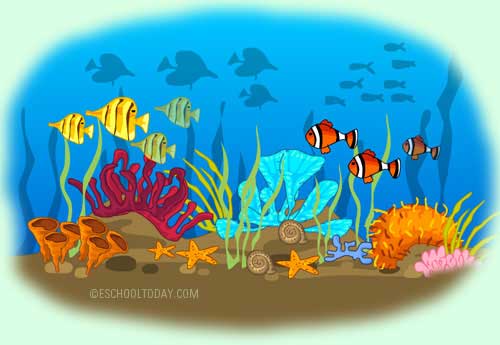 |
How does Ocean Acidification impact us?
The oceans provide extraordinary ecosystem services to societies, food, regulation services (carbon absorption), cultural and recreation as well as nutrient recycling.
Below are some ways that ocean acidification impacts us:
 Marine Calcifiers: Marine Calcifiers:
Some marine ecosystems, particularly those that use Calcium Carbonate to build their shells (such as coral and oyster reefs) could change with increasing ocean acidity. These species are called calcifiers.

“In a future ocean that continues to absorb excess CO2 from industrial emissions, deforestation, and other human activities, sensitive species could lose their protective shells and eventually die out, while other species that build stronger shells could become dominant.” Source: Ocean acidification: A risky shell game, 6 OCEANUS MAGAZINE Vol. 48, No. 1, 2010 www.whoi.edu/oceanus
Shellfish and reef-forming corals are all at risk from the slightest drop in pH. Less survival of these species means less or diminishing coral reef systems. More importantly, these form the habitats of many algae and phytoplankton, which form the basis of all marine ecosystems.
 Biogeochemical cycles: Biogeochemical cycles:
The oceans play a massive role in the carbon cycle, by absorbing  from the upper layers and transporting them to the ocean beds for storage. This is possible by phytoplankton absorbing the from the upper layers and transporting them to the ocean beds for storage. This is possible by phytoplankton absorbing the  and sunlight to produce O2 and Carbohydrates. This is called the ‘biological carbon pump’. The efficiency of the pump depends on the amount of and sunlight to produce O2 and Carbohydrates. This is called the ‘biological carbon pump’. The efficiency of the pump depends on the amount of  absorbed and the calcium carbonate that is produced. Acidic waters reduce the biological component that absorbs the absorbed and the calcium carbonate that is produced. Acidic waters reduce the biological component that absorbs the  , thereby reducing the ocean's capacity to perform its role as a carbon sink. , thereby reducing the ocean's capacity to perform its role as a carbon sink.
 Shell marine animals (Pteropods): Shell marine animals (Pteropods):
Acidic oceans may be corrosive to shell animals in the ocean. It is known that shells of some small marine snails in the southern ocean around the Antartica are already dissolving, potentially altering the food webs of that region. Source: Ocean Acidification, Summary for Policymakers,
Third Symposium on the Ocean in a High-CO2 World. UNESCO
 Economic Losses: Economic Losses:
Mollusks and Oyster larvae are among the species that have been extensively studied under ocean acidification. It is estimated that by 2100, losses due to declines in mollusk production from ocean acidification may be around $130 billion USD. Note that the cultural, spiritual and educational value of the awesome coral reef systems may all be affected, including the shifts that will occur if the acidification continues.
Ocean Acidification. Summary for Policymakers. Third Symposium on the Ocean in a High-CO2 World, Page 10 http://unesdoc.unesco.org/images/0022/002247/224724E.pdf
 
|
 |

![]()